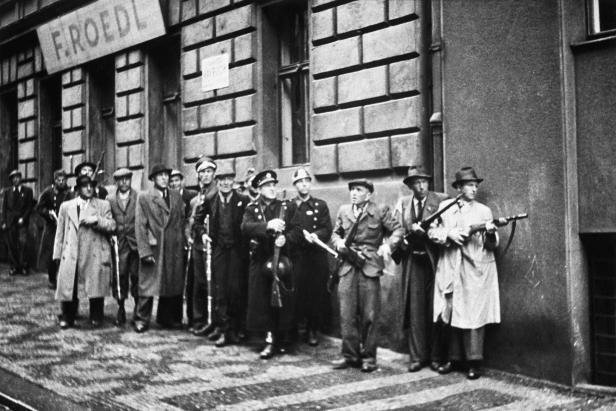The end of the Second World War in Czechoslovakia

Slovak National Uprising
The Slovak National Uprising which took part from August to October 1944 was the armed struggle of rebel Slovak troops against Nazi German Wehrmacht and was situated in Banská Bystrica.
Czechoslovak Government-in-Exile
Czechoslovak Government in Prague was also influential tool as a former president of Czechoslovakia Edvard Beneš hoped for a restoration of the Czechoslovak state and after being recognised by the British government, the Soviet Union and the USA recognised the exiled government as well and thus Beneš sustained the Czechoslovakia president.
The end of the war
On May 1944 Edvard Beneš signed an agreement that the Soviet Union will liberate Czechoslovak territory. On 21st of September, Czechoslovak troops formed in the Soviet Union liberated the village Kalinov (near Dukla Pass). And gradually Czechoslovakia was liberated by Soviet troops; however, southwestern parts of Bohemia were liberated by other Allied troops from the west. There were massacres at the end of the war when German troops killed Czech people when pulling back from Czechoslovakia. There were massacres in Trhová Kamenice or in Javoříčko.
Liberation
A provisional Czechoslovak government was formed by the Soviets in Slovak’s Košice on 4th of April 1945. Bratislava was taken by Sovie Union on 4th of April and Prague was taken on 9th of May during the Prague Offensive. When Soviet troops arrived, Prague was in a general state of confusion due to the Prague Uprising.
On 5th of May 1945 the Prague uprising was bursted out as the symbol of the Czech resistence and the attempt to liberate the capital from the Nazi occupation. The uprising lasted until 8th of May 1945 which end in a ceasefire just one day before the Soviet troops arrived and only a day after the Victory of Europe against the Nazi ideology.
 +420 602 340 001
+420 602 340 001 info@citybike-prague.com
info@citybike-prague.com








